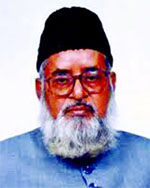
Staff Reporter :
International Crimes Tribunal-2 (ICT-2) on Wednesday awarded death penalty to Jamaat-e-Islami leader Abdus Subhan for his involvement in the crimes against humanity during the Liberation War of Bangladesh in 1971.
Subhan, nayeb-e-ameer of Jamaat-e-Islami, was found guilty of six charges of nine allegations, while the allegations were not proved in the other three charges.
Chairman of the Tribunal-2 Justice Obaidul Hassan, Justice Md Mozibur Rahman Miah and Judge Md Shahinur Islam, delivered the verdict in the presence of Subhan.
In the verdict, the Tribunal said the accused Sobhan is found guilty of the offences of murder, abduction, confinement, torture and extermination as ‘crimes against humanity’ under the Section 3(2) of the International Crimes (Tribunals) Act, 1973.
Subhan was sentenced to death on charge 1, 4 and 6 as the allegations were proved beyond reasonable doubt. He was given imprisonment till death on charge 2 and 7, while five years imprisonment on charge 3. Sobhan has been acquitted of charge 5, 8 and 9 as the alleged offences were not proved.
It has been proved that accused Sobhan had actively and knowingly induced Pakistan army to carry out attacks and kill hundreds of civilians during the Liberation War, the Tribunal said.
Considering the magnitude of crimes, the Tribunal did not take the old age of Subhan as a mitigating factor. “It is true the accused person is now a man of advanced age but he has been prosecuted and tried for the appalling atrocities committed in 1971,” Justice Hassan said in the verdict.
The tribunal also termed Jamaat-e-Islami as pro-Pakistani organisation during the time Liberation War.
In an instant reaction, prosecutor Advocate Sultan Mahmud Simon expressed his satisfaction over the verdict. Subhan committed different crimes against humanity during the Liberation War including murder, extermination, torture, rape, arson and confinement. “We produced the documents and evidences about his involvement in the atrocities and sought the highest punishment for him. The tribunal considered the gravity of the charges and awarded him with the capital punishment,” he said.
“He killed innocent people with firearms and sword with his own hands. I am happy because the justice was done with the punishment of Subhan,” Simon added.
However, the defence counsel advocate M Shishir Munir said the Jamaat leader deprived of justice as the allegations were not proved against him.
“The evidences against the accused person were not strong enough to prove the allegations. There were so many inconsistent things in the prosecution’s documents and evidences that could not be legally accepted,” he said.
“Once the prosecutors said they visited a spot of incident where the alleged crimes took place. But in fact that place does not exist now. It disappeared in the river erosion many years ago,” he said. “Some witnesses claimed themselves as eye witnesses but they were of two, three and five years old in 1971. So, their claims could not be accepted,” Munir said.
“We are aggrieved with the verdict. We’ll file appeal against the judgement within the stipulated time. Hopefully we’ll get justice at the higher court,” he said.
Subhan was awarded with capital punishment for his active part in the killing of around 400 people. He collaborated the Pakistan army to carry out the killing in several villages of Satbaria union under Sujanagar upazila of Pabna district on May 12 in 1971.
He was sentenced to death also for killing five people, looting and torching several houses in Sahapur village in Ishwardi of Pabna on May 2 and for abduction and killing innocent people in Ishwardi on April 17 and 18 in 1971.
The Tribunal framed charges against Subhan for his involvement in 1971 crimes on December 31, 2013.
Prosecution submitted formal charge against Sobhan on September 15, 2013 and the tribunal took the offences into cognizance on September 19 in the same year.
Sobhan was arrested with links to a different case on September 20, 2012. Prosecution prayed for a detention order against him from the tribunal on the allegations of crimes against humanity on September 23.
As per tribunal’s order, Subhan was produced before the tribunal on September 30, 2012. The tribunal showed him arrested on the same day on the allegations of crimes against humanity committed during the Liberation War in 1971.
Subhan was the ameer of Pabna Jamaat-e-Islami and the secretary and vice president of the Pabna unit of so-called ‘Peace Committee’ during the Liberation War.

